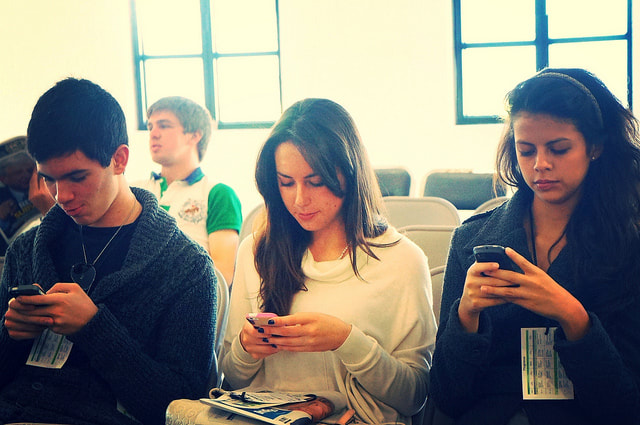|
Vol 12, Issue 12 Janelle Koh and Declan Fry Declan: Chatting is a lot harder than it used to be. On my Twitter recently I saw someone stressing about how many messages they should send to a person who wasn’t replying. They settled on three. Janelle: I wouldn’t say harder - I think a lot more work goes into it and we expect a lot more out of it than we used to, but so much of it has become intuitive. So much of it is just ‘rules of engagement’, things we’re expected to know before we even start a conversation. D: Do you worry that social media platforms are too limited by the context of their conception? Facebook seems largely like a virtual simulation of the inside of Mark Zuckerberg’s head: white, middle-class, cis-gendered, heterosexual. Not to mention that it began as a campus ‘hotties’ rating system. What if his wife, Priscilla Chan, had created it instead? I’d like to think it would have been different; but a part of me worries that, given the nature of power structures in society, it wouldn’t. You know, men can’t always be expected to keep the ship of patriarchy sailing steadily on by themselves. We need those who don’t necessarily benefit (assuming anyone really benefits) to help us out. As Jessa Crispin wrote in Why I Am Not a Feminist: ‘Now that women are raised with access to power, we will not see a more egalitarian world, but the same world, just with more women in it.’
J: I find it really hard to take Zuckerberg out and slot Chan in so easily - you would have to assume they had the same socioeconomic circumstances and privileges to even envisage a position where she would be, not simply capable of, but confident enough to helm a tech startup company in a male dominated industry. It’s an interesting point you make about women helping to keep the patriarchy sailing. It seems to me that women help by omission - lacking the confidence to make positive acts on a daily basis is what drives the patriarchy. Why is it that silence in the patriarchy is a sort of implied acquiescence? D: Subjugation is pretty exhausting, even for the party on top; hence it’s important to mould those in the weaker position to keep themselves there while you’re out enjoying a round of golf or whatever. J: I would say that the fact that Zuckerberg, a White American man created Facebook is not the only determinant of what goes on between the lines of our personal newsfeeds. It is also subject to the compositions within the society in which our feeds are created. It is hard to ignore the presence of African Americans, or Latin Americans, or Asian Americans in the US. D: And yet this again often replicates old racial politics in contemporary online language. Look at the prevalence of white folks using black speech and images in GIFs and memes: isn’t this just a new apparition of blackface being played out online? People like Steven Buryani have talked about how AI is learning our worst impulses – even robots can be racists. Being made by humans, their algorithms inherit our biases and bigotries. In May last year, a report claimed that a computer program used by a US court for risk assessment was biased against black prisoners. The program (Compas) was much more prone to mistakenly label black defendants as likely to reoffend – wrongly flagging them at almost twice the rate as white people (45% to 24%). Facebook itself is automated and robotic in certain areas, such as where it relies on algorithms to deliver news. So I guess it might not matter whether Chan or Zuckerberg made Facebook – like an episode of Rick and Morty we could discover that in every possible world our technologies consistently reflect dominant societal structures regardless of automation. Perhaps this simply means that Facebook’s origins as a compilation of hotties is the most honest and human thing about it, even if it does reflect a culture of objectification. J: It seems to me that the problem you have with Facebook is essentially one of form. You acknowledge that the structure of Facebook informs its content, and I agree - it would be naive to believe otherwise. But where does this understanding of structural discrimination leave us? It’s necessary to understand the ways in which discrimination plays out, particularly by looking into the intersections between cultures, spaces wherein cross-cultural understanding can be provoked. And I think the great potential for Facebook is that each of our newsfeeds, though informed deeply by our own backgrounds, is also subject to being informed by the backgrounds of others. Because for every three Asians that like a funny video about their crazy Asian mother, maybe somewhere out there, there is one white person who ‘gets it’ too. Janelle Koh is a second-year JD student and Declan Fry is a third-year JD student The rest of this issue (:O)
NPJ
16/10/2017 11:10:23 pm
Interesting format.
confused
18/10/2017 07:05:36 am
wait so why is facebook racist/sexist/cisgenderist?
Do you guys, ever, like, think at all about the word vomit you write?
18/10/2017 02:49:52 pm
Apparently Facebook's current fusion of bland instant messaging and slot-machine scrolling is inherently white, male and straight?
Right Thurr (is an apparition of blackface when I sing it)
18/10/2017 07:05:41 pm
"What if his wife, Priscilla Chan, had created it instead?"
Jenny
19/10/2017 12:17:33 pm
Facebook and racism: http://www.independent.co.uk/voices/got-a-french-flag-on-your-facebook-profile-picture-congratulations-on-your-corporate-white-supremacy-a6736526.html Comments are closed.
|
Archives
October 2022
|



